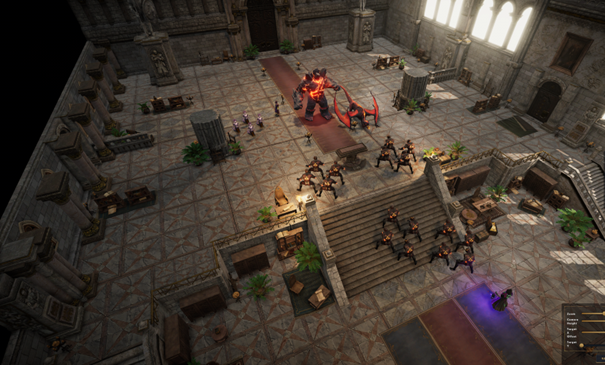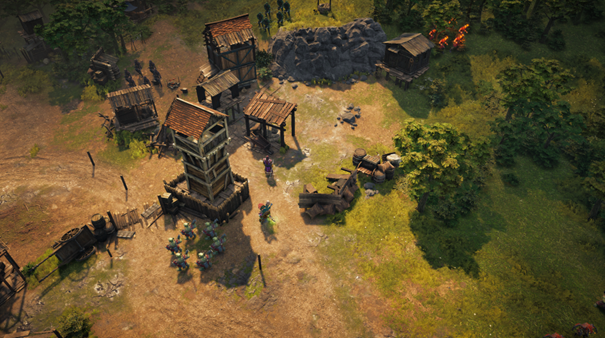Developer Insight #3 - Time for battles -
Posted: Tue 22. Nov 2022, 10:25
Greetings, dear mages,
Today we're going to talk a little bit about battles and some of the things we're doing to make them more interesting. Turn-based combat is at the heart of our battles, and especially for a brand whose core has been real-time strategy, it was important for us to make it turn-based but brisk, while still providing tactical depth.
One of the ways we achieved this was by limiting the number of units in battle (you start with groups of up to 5 different squads, but can increase to up to 8 squads as the game progresses), but providing over 60 different handcrafted battlefields. These allow us to make terrain and cover an integral part rather than relying on randomized maps. Thinking about where to attack your enemies, how to expose your front as little as possible (so you don't suffer flank attacks), or which unit to use as a tank makes each battlefield different from the start, which sets us apart from traditional instanced battles in other games that simply pit rows of units against each other in more or less open fields.
Add to that the special abilities for many of our units (which gain new key abilities every 5 levels as they level up), which offer new tactical options such as ignoring zones of control, blinding enemies, volleying shots and armor breaking, or increasing certain types of damage from elemental to white or death to damage against certain types of enemies - quite a mix.

One of our challenges was to get the AI to understand and use this wide range of possible options - particularly in terms of how it uses terrain to its advantage, but which also allows us to design even battles with relatively few units to be quite demanding on the players.
In the following case, the AI was defending a village, but moved to the elevated position to shoot projectiles at the player troops. And since the map has an additional effect called "sniper" that deals damage to attackers every turn, the AI decided to wait for our troops and gather on a hill.

Now the player has to find solutions beyond simply sneaking up on the enemy and letting go of the apprentice's spells. In this case, the AI was tricked into splitting its troops by destroying the village gate and faking an attack from the left while baiting the defenders with a weak unit on the right (in case you're wondering how to solve this). Then the Goblin Shaman gave everyone Berserker Mushrooms to heal up a bit and deal extra damage, meaning they could catch the defenders' first volley and then go into melee.
Another thing we're going to do a little differently is our action system, which is more than just a way to determine how many attacks your units can make, and we'll take a closer look at that next time.
Today we're going to talk a little bit about battles and some of the things we're doing to make them more interesting. Turn-based combat is at the heart of our battles, and especially for a brand whose core has been real-time strategy, it was important for us to make it turn-based but brisk, while still providing tactical depth.
One of the ways we achieved this was by limiting the number of units in battle (you start with groups of up to 5 different squads, but can increase to up to 8 squads as the game progresses), but providing over 60 different handcrafted battlefields. These allow us to make terrain and cover an integral part rather than relying on randomized maps. Thinking about where to attack your enemies, how to expose your front as little as possible (so you don't suffer flank attacks), or which unit to use as a tank makes each battlefield different from the start, which sets us apart from traditional instanced battles in other games that simply pit rows of units against each other in more or less open fields.
Add to that the special abilities for many of our units (which gain new key abilities every 5 levels as they level up), which offer new tactical options such as ignoring zones of control, blinding enemies, volleying shots and armor breaking, or increasing certain types of damage from elemental to white or death to damage against certain types of enemies - quite a mix.

One of our challenges was to get the AI to understand and use this wide range of possible options - particularly in terms of how it uses terrain to its advantage, but which also allows us to design even battles with relatively few units to be quite demanding on the players.
In the following case, the AI was defending a village, but moved to the elevated position to shoot projectiles at the player troops. And since the map has an additional effect called "sniper" that deals damage to attackers every turn, the AI decided to wait for our troops and gather on a hill.

Now the player has to find solutions beyond simply sneaking up on the enemy and letting go of the apprentice's spells. In this case, the AI was tricked into splitting its troops by destroying the village gate and faking an attack from the left while baiting the defenders with a weak unit on the right (in case you're wondering how to solve this). Then the Goblin Shaman gave everyone Berserker Mushrooms to heal up a bit and deal extra damage, meaning they could catch the defenders' first volley and then go into melee.
Another thing we're going to do a little differently is our action system, which is more than just a way to determine how many attacks your units can make, and we'll take a closer look at that next time.